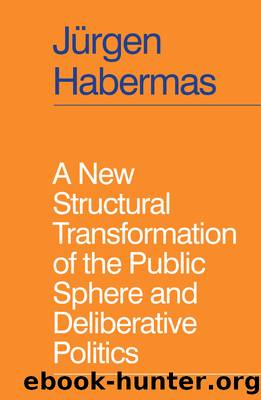A New Structural Transformation of the Public Sphere and Deliberative Politics by Jürgen Habermas

Author:Jürgen Habermas [Habermas, Jürgen]
Language: eng
Format: epub
Published: 2023-06-29T00:00:00+00:00
Notes
1 An earlier version of this chapter was published as Jürgen Habermas, âReflections and Hypotheses on a Further Structural Transformation of the Political Public Sphereâ, Theory, Culture & Society 39/4 (2022): 145â71.
2 Martin Seeliger and Sebastian Sevignani (eds.), Ein erneuter Strukturwandel der Ãffentlichkeit? (Leviathan, Special Issue 37) (Baden-Baden: Nomos, 2021). See Habermas, The Structural Transformation of the Public Sphere: An Inquiry into a Category of Bourgeois Society, trans. Thomas Burger and Frederick Lawrence (Cambridge: Polity, 1989); originally published as: Strukturwandel der Ãffentlichkeit: Untersuchungen zu einer Kategorie der bürgerlichen Gesellschaft (Neuwied: Luchterhand and Frankfurt am Main: Suhrkamp, 1962).
3 Bernhard Peters, Die Integration moderner Gesellschaften (Frankfurt am Main: Suhrkamp, 1993), and Peters, âOn Public Deliberation and Public Culture: Reflections on the Public Sphereâ, in Hartmut Wessler (ed.), Public Deliberation and Public Culture: The Writings of Bernhard Peters, 1993â2005 (London: Palgrave Macmillan), pp. 134â59; from this perspective, see also Hartmut Wessler, Habermas and the Media (Cambridge: Polity, 2018).
4 On the relationship between the political and literary public spheres, see my sidelong glance in Habermas, âWarum nicht lesen?â, in Katharina Raabe and Frank Wagner (eds.), Warum Lesen â mindestens 24 Gründe (Berlin: Suhrkamp, 2020), pp. 99â123.
5 The chapter on the role of civil society and the political public sphere in Between Facts and Norms â Habermas, Between Facts and Norms: Contributions to a Discourse Theory of Law and Democracy, trans. William Rehg (Cambridge, MA: MIT Press, 1996), pp. 329â87 â takes up the reflections in the concluding chapter of Structural Transformation of the Public Sphere, and especially in the introduction to the new 1990 edition of Strukturwandel der Ãffentlichkeit: Habermas, âFurther Reflections on the Public Sphereâ, in Craig Calhoun (ed.), Habermas and the Public Sphere (Cambridge, MA: MIT Press, 1992), pp. 421â61. For more recent reflections on the topic, see Habermas, âPolitical Communication in Media Society: Does Democracy Still Have an Epistemic Dimension? The Impact of Normative Theory on Empirical Researchâ, in Europe: The Faltering Project, trans. Ciaran Cronin (Cambridge: Polity, 2009), pp. 138â83.
6 Usually, however, sociological theories choose a basic conceptual approach that leaves the cognitive meaning of this dimension of validity out of account and attributes the binding effect of ought-validity [Sollgeltung] to the threat of sanctions.
7 The text of the French Constitution of September 1791 opens with a catalogue that distinguishes between droits naturels and droits civils. In this way, it took into account the temporal discrepancy between the current domain of validity of the general civil rights and the as yet unrealized claim to validity, which extends far beyond the territorial boundaries of the French state, of the ânaturalâ rights to which all persons have an equal claim in virtue of their humanity. Paradoxically, however, the human and civil rights enshrined as basic rights preserve the meaning of universal rights within national borders as well. In this way, they remind the present and future generations, if not of a self-obligation to actively propagate these rights, then at least of the peculiar character of the context-transcending normative content of universal human rights beyond the provisionality of their at present territorially restricted implementation.
Download
This site does not store any files on its server. We only index and link to content provided by other sites. Please contact the content providers to delete copyright contents if any and email us, we'll remove relevant links or contents immediately.
| Anarchism | Communism & Socialism |
| Conservatism & Liberalism | Democracy |
| Fascism | Libertarianism |
| Nationalism | Radicalism |
| Utopian |
The Secret History by Donna Tartt(16681)
The Social Justice Warrior Handbook by Lisa De Pasquale(11496)
Thirteen Reasons Why by Jay Asher(7810)
This Is How You Lose Her by Junot Diaz(5805)
Weapons of Math Destruction by Cathy O'Neil(5058)
Zero to One by Peter Thiel(4841)
The Myth of the Strong Leader by Archie Brown(4797)
Promise Me, Dad by Joe Biden(4463)
Beartown by Fredrik Backman(4447)
How Democracies Die by Steven Levitsky & Daniel Ziblatt(4430)
Stone's Rules by Roger Stone(4427)
The Fire Next Time by James Baldwin(4357)
100 Deadly Skills by Clint Emerson(4095)
A Higher Loyalty: Truth, Lies, and Leadership by James Comey(4045)
Rise and Kill First by Ronen Bergman(4029)
The David Icke Guide to the Global Conspiracy (and how to end it) by David Icke(3900)
The Farm by Tom Rob Smith(3884)
Secrecy World by Jake Bernstein(3793)
The Doomsday Machine by Daniel Ellsberg(3743)
